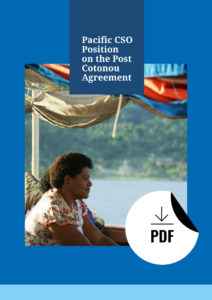
Background of Post-Cotonou Trading (PCN)
The Cotonou Partnership Agreement (CPA) between the EU and its former colonies in the ACP (Africa, Caribbean and Pacific) regions ends in 2020. This partnership marks more than 50 years of north-south relations between the EU and the States ACP, facilitated under the initial Yaoundé agreements, the Lomé Conventions, and the Cotonou Partnership Agreement that is ending.
Since the start of negotiations for a new agreement in 2018, DAWN has engaged with a number of regional CSOs in critically analyzing EU and ACP negotiating priorities towards a legally binding agreement and contributing to the first Pacific CSO report to convey a number of initial concerns to Pacific leaders who participated in an EU/ACP Pacific dialogue in early 2019. The Pacific CSO report was well received and, after much advocacy by NGOs, Civil Society Organizations in the Pacific were invited to observe at the High Level Political Forum Dialogue between the European Union and the Pacific ACP in Samoa.There is still no formal mechanism for engagement with CSOs in Post-Cotonou Negotiations (PCN), with much of the engagement on an ad-hoc basis and on goodwill between CSO stakeholders and key negotiators. This has led to ongoing national consultations in Fiji and more statements and presentations from the Pacific CSO collective.
DAWN’s work on PCN
DAWN has been working in partnership with Pacific Network on Globalization (PANG) on Blue Economy issues. The EU’s interests in Pacific ocean resources, particularly Deepsea mining (DSM) and fisheries, have led DAWN to engage with PANG and other Fiji-based CSOs who are concerned about the renegotiation of the EU/ACP partnership in tracking and search influence the negotiations. In addition to PANG and DAWN, the organizations that were primarily involved in this work are Pacific Island NGO Association (PIANGO), Oxfam Pacific, Fiji Social Services Council (FCOSS), Social Empowerment Education Program (SEEP), Soqosoqo Vakamarama (SSVM) and DIVA, with support from some other Pacific regional and national NGOs.
DAWN contributed critical analysis to CSO submissions for Pacific governments and negotiators, helped draft text and propose alternative language, participated in consultations, made oral presentations with recommendations on behalf of the CSO Working Group for Pacific Governments and Negotiators and co-presented on the occasion to Brussels-based negotiators, the ACP secretariat and other representatives of regional bodies on behalf of Pacific CSOs.
DAWN shares the concerns of Pacific CSOs about the EU’s trade, investment and natural resources interests that are being openly pursued through negotiations on this binding agreement, as these have significant development implications. As a Southern feminist organization that tracks, critiques and challenges global development frameworks, policies and binding negotiations between global Northern and Southern countries from a perspective of economic justice, gender justice and ecological justice, DAWN is following and criticizing the disturbing content of this partnership agreement between the EU and the ACP States from a South Pacific feminist development perspective .
DAWN’s PCN work was entirely Pacific-based, as we were not able to involve feminists in the African and Caribbean regions in this work. However, in June, DAWN participated in an interregional webinar with the Gender and Trade Coalition and Third World Network. The webinar, on ‘ Post-Cotonou Agreement: Transregional Perspectives and Resistance ‘, discussed what is at stake in the negotiations, shared lessons for mobilization and proposed progressive and feminist alternative approaches. A recording of the webinar can be found here .
Pacific CSO Concerns with PCA
It is worrying that the Post-Cotonou Agreement will be legally binding on sovereign states in the African, Caribbean and Pacific regions for 20 years. This means that it will force the future governments of all ACP States to abide by the agreement for 20 years. The closed-door nature of the negotiations – which are being conducted in virtual secrecy – has excluded any possibility of public scrutiny and denies the formal participation of civil society organizations in the negotiations. The Pacific CSO group basically informally pressured the process of delivering the 1st CSO information document from thePacific to the representatives of the Pacific and subsequently used every opportunity to present proposals and offer recommendations and alternative text based on leaked drafts of the agreement.
The EU’s negotiating mandate is unequivocally aimed at achieving “undisturbed access” for European investors to natural resources in ACP countries, as well as investor protection. For the Pacific, this is worrisome, as it means the EU can guarantee guaranteed access to fisheries and deep-sea minerals in pursuit of its Blue Economy agenda, as well as incorporate investor-state dispute settlement clauses into the agreement. . As PANG’s Maureen Penjueli points out, the EU also wants to use the post-Cotonou agreement ‘to bind the ACP to mandatory coordination and joint positioning in international organizations and meetings, including the WTO, where the EU agenda has been detrimental to aspirations. of development of island [Pacific] countries. ‘
The current state of the game
In August 2020, negotiations were in their final stages and should be completed by October 2020, with adoption and signing scheduled to take place in early 2021. Due to delays in negotiations, an extension protocol with the CPA was triggered to allow to continue conditions while negotiations are ongoing in 2020. This has implications for the EU’s existing development assistance mechanism – the European Development Funds (EDF) – as well as for the existing trade rules that protect ACP states (Clause to meet). Final negotiations are focused on contentious elements of the key document (the evolving draft). This includes means of implementation, SRHR and SOGI provisions, and migration.The June 2020 draft text can be accessed here .
The COVID 19 global pandemic not only delayed the negotiations, but also moved them to virtual mode. This is cause for concern, as virtual negotiations become more opaque and exclusionary from CSOs.
As the negotiations conclude and States prepare to formally adopt and sign the Post-Cotonou Agreement, Southern global CSOs in ACP regions should consider requiring public scrutiny of the agreement, including by parliaments, before States do so. enter into this binding 20-year agreement.
